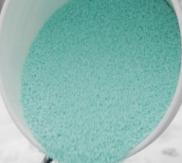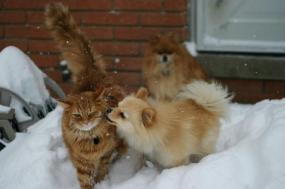It’s that time again when Old Man Winter shows up in Idaho. It’s important to protect your pets from the cold, snow, and ice, especially puppies and kittens and older cats and dogs who probably don’t have the fat, full coat, or metabolism to stay warm.
Here are 5 tips that will help your pet stay safe.
Keep the Antifreeze Out of Reach
Antifreeze does just what it sounds like—keeps your engine from freezing up during the winter. Most antifreeze contains ethylene glycol, which is highly poisonous. Your pet will be attracted to the sweet smell and taste, but just a small amount can damage the kidneys quickly and if not treated immediately, will result in death. Cats are especially susceptible, and can die from ingesting as little as a tablespoon! Keep the bottles tightly capped and somewhere your pet can’t get to them, and check to make sure that it doesn’t drip onto the ground.
Ice Melt Can Harm Paws 
No one wants to slip and fall on ice, so Ice Melt seems to be the answer. However, it’s important to purchase a product that is safe for your pet’s paws. Ice melt contains chemicals that are harmful to your pet as it can burn their foot pads. Another danger is if they lick their paws after being outside and ingest the chemicals. It’s a good idea to wipe your dog’s paws with a wet towel when they come inside, to remove any residual chemicals they may have on their feet. Tractor Supply is pretty good about stocking pet friendly ice melt.
Fresh Water
While you may think it’s okay that your pet eats snow, it’s not the best way to keep them hydrated. You have no idea what might be in the snow (think yellow snow) that could cause some type of intestinal distress. Plus, it takes a lot of snow to make a tiny bit of water! Make sure there is fresh water outside, and replace it if it freezes. Also, consider buying a heated water bowl.
Don’t Leave Your Pet in the Car Most people are aware that they shouldn’t leave their pets in the car during the summer because it gets hot inside and pets can die from the heat. However, people don’t realize that the same is true for winter months. Just as heat builds up in cars in the summer, cars also hold in cold air. The danger is that your pet may suffer  frostbite or freeze to death. Another danger is if you are heating up your vehicle in an enclosed garage, the carbon monoxide could build up and poison your pet.
frostbite or freeze to death. Another danger is if you are heating up your vehicle in an enclosed garage, the carbon monoxide could build up and poison your pet.
Limit Exposure
Just because your pet has fur doesn’t mean that they are going to be warm. It’s best to limit how long your pet is outside in the cold unless they have adequate shelter from the snow and wind. If your pet is older, the cold can flare up arthritis, and make it very uncomfortable for him. If it feels cold outside to you, and you’re all bundled up in your coat and hat, don’t kid yourself that your pet isn’t chilly too!
Signs of Hypothermia and Frostbite
Your pet can suffer from hypothermia and frostbite just like people do.
Watch for these signals of hypothermia:
• Weak pulse
• Shivering followed by lethargy
• Breathing problems
• Stiff muscles
• Decreased appetite
And watch for these signs of frostbite:
• Pain in ears, paws, or tail
• Skin that doesn’t warm up
• Shriveled skin
• Skin that is pale, gray, or blue then turns red
If you think your pet exhibits any signs of hypothermia or frostbite, don’t wrap them in heating pads or electric blankets, or put a hair dryer on them. Instead, get them into a warm room, and call Dr. Newman immediately at 208-233-2844. This is a medical emergency!
You can also call Dr. Newman if you have any other concerns about keeping your pet safe during the winter. She’s always happy to help!


